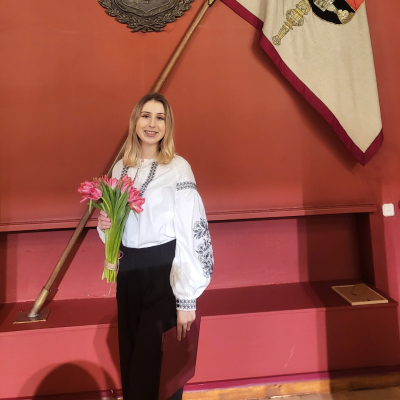
Iryna Huliuk
IIRPS VU alumna
You just graduated from Eastern European and Russian studies at IIRPS VU, how did you find out about the Institute? And how did you decide to study in Lithuania?
I had already visited Lithuania as an exchange student in 2020. Even though the pandemic made that experience not as exciting as it could have been, I had a very good impression of the country and its system of education. As a holder of the Lithuanian state scholarship for short-term studies, I was aware of the funding opportunities offered by the Education Exchange Support Foundation. Thus, when searching for Master’s programs abroad, I considered, among others, the options available at Lithuanian universities. The Eastern European and Russian studies programme at IIRPS VU aligned with my interests and needs as well as appeared to have an interesting curriculum. Once again, I received a Lithuanian state scholarship, which allowed me to have plenty of time to focus on my studies. I will always be thankful to the Education Exchange Support Foundation for these opportunities.
Additionally, I happened to be in Lithuania when Russia launched its full-scale war against Ukraine in February 2022. The strong support and solidarity I witnessed among Lithuanians played a significant role in my decision to pursue further studies at IIRPS VU.
What was the most interesting thing from your studies?
I truly enjoyed the variety of subjects available for selection. While all the topics were interesting and relevant, the option to choose electives enabled me to delve into the subjects that appealed to me the most. Throughout our discussions, we were part of quite international groups, which was particularly engaging due to the contrasts in opinions and views. Studying alongside people from different parts of Europe and the world has been a truly enriching experience. In this environment, you learn to listen to each other, recognizing that despite the differences, we have many similarities. It broadens your understanding of issues by exposing you to various perspectives.
You got an award certificate for the best master thesis in your field, could you tell me more about the writing process and share some tips with other students?
The writing process in my program was divided into various stages, which was extremely helpful. Each semester, we had courses dedicated to thesis writing, along with tasks that required submission at the end of the term, whether it be a thesis proposal with a literature review or a section of the actual thesis. If not for this careful design, it would have been much harder for me to complete it.
When it comes to tips, the first suggestion is to choose a topic that genuinely interests you, even if you may not be as familiar with it. Careful consideration of the theoretical foundation and thesis methodology from the outset can also prove to be time-saving in the long run. I would recommend investing a significant amount of effort into the research proposal and not hesitating to seek advice from experienced professors. Once approved, it is advisable to stick to the initial topic, given that you have already conducted some preliminary research on it. Be ready to face the fact that some things may need to be adjusted and re-adjusted; written and re-written; excluded and re-included. Thesis writing can be, to a great extent, a dynamic process. Probably the most important tip is to collaborate closely with your thesis supervisor and seek their opinion whenever in doubt. While I understand that some supervisors may not be as readily available as others, it is in your best interest to seek a response from them, even if it requires following up on your request. I would not have been able to write such a thesis without the invaluable guidance and expertise provided by my supervisor.
What are your plans right now, after your studies? What are you looking forward to?
My plans include undertaking internships to gain practical experience in the field and the public sector in general. I also hope to contribute to VU research projects and further improve my Lithuanian language skills. I look forward to positively influencing Ukrainian-Lithuanian relations by working either in traditional or public diplomacy in the longer term future.
What would you like to wish the IIRPS VU community?
I would like to wish this community to continue evolving into an even more international and diverse space, to remain resilient, and to stay true to its core values. It is a wonderful place for growth, curiosity, and the cultivation of knowledge. I hope and wish that it remains this way for years to come!







